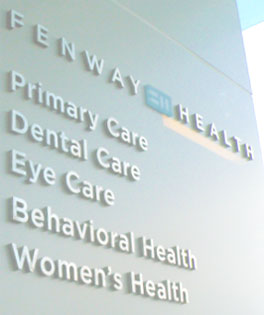
|
 |
previous page |
|
next page |
|
 |
In 2010, Fenway Health saw more patients in all of our practices and continued to extend our reach as we cared for our community. |
|
Providers at Fenway Health cared for more than 15,000 patients that made more than 80,000 visits. Fenway served our community from two locations; our 1340 Boylston Street Ansin Building location and at our 142 Berkeley Street Fenway: South End office. The Ansin Building is a 10-story, 100,000 square foot health care and research facility. It is the largest building ever constructed by an organization with a specific mission to serve the LGBT community. Fenway: South End offers a private practice setting that is convenient to people who live and work in Boston’s South End and Back Bay neighborhoods.

|
|
|
Fenway Health is the largest outpatient HIV medical provider in New England, providing care for more than 1,500 people living with HIV/AIDS. One-fifth of known HIV-positive Boston-area people receive care at Fenway Health.
Fenway’s Behavioral Health providers saw nearly 2,400 patients who made more than 1,700 visits a month for individual therapy, 170 monthly visits for group therapy and 380 monthly psychopharmacology visits.
The Fenway Pharmacy’s two branches filled an average of 350-400 prescriptions per day and participated in several discount programs accommodating the limitations and needs of all Fenway patients. The pharmacy also offered a free delivery service for homebound patients and others who need it and gave away more than $250,000 in prescription medication to people in need. |
|
 |
Fenway’s dental care program had more than 5,000 patient visits and our eye care services had more than 4,000 visits. Both programs serve adults and children at our Ansin Building location. Dental services include cleanings, check-ups, x-rays, oral health screenings, fillings and esthetic consultations and tooth whitening. Eye care services include eye exams, diagnosis and management of common eye diseases, low vision services, eyeglass consultations and fittings, and contact lens fittings and evaluation.
The Alternative Insemination (AI) Program at Fenway Health, believed to be the first of its kind in the United States, has assisted with the conception of more than 380 babies. In addition to inseminations, the AI Program offers social and emotional information and support in the form of workshops and groups for LGBT parents and prospective parents.
Fenway’s health insurance enrollment program, known as the Fenway Connector, helped nearly 650 people get approved for coverage under MassHealth, Commonwealth Care and Health Safety Net.
The Transgender Health Program was established to comprehensively address the needs of Fenway’s growing transgender patient base. More than 400 transgender patients received their care at Fenway Health and Fenway: South End in fiscal year 2010.
Fenway’s Substance Abuse Treatment Program saw more than 300 new patients. Most of these people had problems with multiple substances, including alcohol, crystal methamphetamine and cocaine. No one was turned away for lack of ability to pay and many patients were referred into other services at Fenway.
Fenway Health’s medical providers and HIV Counseling, Testing and Support Services staff administered nearly 3,500 HIV antibody tests. Nearly 70 percent of those seeking tests identified as men who have sex with men and the remainder described their HIV risks as heterosexual sex, injection drug use or occupational exposure. The majority of those who tested positive for HIV were triaged into care and services here at Fenway. |
|
|
Fenway’s Violence Recovery Program (VRP) treated almost 160 victims of bias crimes, domestic violence, sexual assault and police misconduct. The VRP offered individual and group counseling, including the trauma support group, domestic violence support group, and male survivors of sexual abuse/assault group. They also spoke about LGBT recovery from trauma on a national level at conferences and roundtables throughout the year and provided technical assistance and training to the Boston Police Department, District Attorney’s offices, hospitals, health centers, social service agencies and community and school groups.
Fenway’s LGBT Helpline and Peer Listening Line for LGBT Youth answered almost 4,000 calls from people across the country looking for resources or just a friendly ear to listen to what they are going through. 1,600 of those calls were from the South and Midwest
As fiscal year 2010 drew to a close, we were also working closely with our community partners at JRI Health ensure the Sidney Borum, Jr. Health Center’s smooth transition to the Fenway Health family. The Borum, as it is affectionately known by its patients, provides medical and behavioral health care for young people ages 12 to 29, many of whom are LGBT or questioning, living with or at-risk of HIV infection, gang-involved, in need of reproductive health services, using substances or living on the streets. The staff and providers at the Borum have earned the trust of these teens and young adults and created a safe and comfortable space for them to access care and services. The Sidney Borum, Jr. Health Center officially became a part of Fenway Health on July 1, 2010, the start of our 2011 fiscal year. |
 |
| |
| |
|
20110214v.1.
|
|



